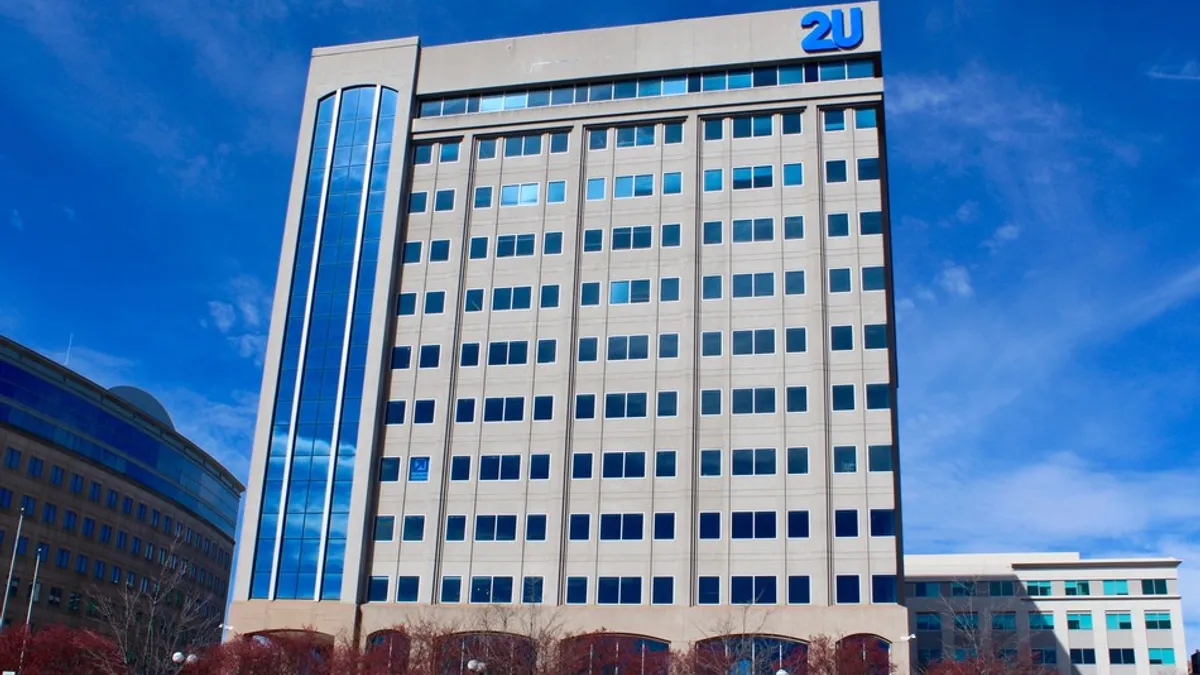Dive Brief:
- 2U CEO Chip Paucek was optimistic on a call with analysts Thursday to discuss the company's first quarter earnings that more colleges would be interested in its services as a result of the pandemic.
- The online program management (OPM) company's graduate programs and its acquisition of boot camp provider Trilogy Education Services drove revenue up 44% year-over-year to $175.5 million, Paucek said.
- 2U joins several other educational service providers that see an opportunity to grow their business in the wake of the coronavirus crisis, though the company previously shared concerns about its effect on customers.
Dive Insight:
Although scores of colleges scrambled to transition their classes to virtual instruction to finish the academic year, many lack the digital infrastructure to provide entirely online programs. But with the potential for the pandemic to stretch into the fall term, observers say colleges could be looking for help to go online.
"We're in the midst of witnessing a paradigm-shifting moment for online education from which I believe 2U will emerge substantially stronger," Paucek said.
He expects the pandemic will spur demand for 2U's traditional revenue-share model, in which the company covers the costs of launching an online program in exchange for a cut of its tuition revenue.
"The need to deliver truly high-quality online programs — not just remote live lectures — at a time when universities are facing unprecedented financial constraints and challenges makes our traditional full investment model even more compelling and valuable," Paucek said.
Paucek's optimism contrasts with a filing the company made last month with the Securities and Exchange Commission. It said the pandemic could "severely impact" its business by causing one of its college partners to shut down or making it harder to find clients that want to launch online programs. Colleges nationwide are bracing for massive budget cuts, and state funding to higher education is expected to take a hit.
The filing also expressed concerns with "interruptions or disruptions" of 2U's in-person boot camps, which were moved online. But so far, Paucek said, the transition has gone smoothly, adding that they may remain online once the crisis subsides.
The company has been providing services to aid colleges with the rapid transition to online learning. In mid-March, 2U debuted No Back Row Pro, which gives free training on effective online teaching to faculty members at its partner institutions.
It's also rolling out products that will offer colleges a "lighter deployment" of the company's proprietary operating system to help them prepare for the fall semester, Paucek said. They will be offered on a fee-for-service or revenue-share basis, depending on the client.
Paucek didn't share more details on the call.
Strategic Education Inc., the parent company of for-profit universities Strayer and Capella, announced this week that it's also hoping to enter the educational services market.
Following the pandemic, the country will be more accepting of the "legitimacy of online instruction," said Karl McDonnell, the company's CEO. However, Strategic Education plans only to offer colleges technology and instructional support — not marketing, enrollment or admissions help.
Colleges' budgets have taken a bruising hit from the pandemic. Many are refunding students' room and board fees and losing out on auxiliary revenue, such as from summer programs. At the same time, they've had to invest in their digital infrastructure and, in some cases, give students more aid to help them stay enrolled.
Moody's Investors Service downgraded its outlook for the sector to negative and predicted that colleges will face "unprecedented enrollment uncertainty" over the next academic year.











